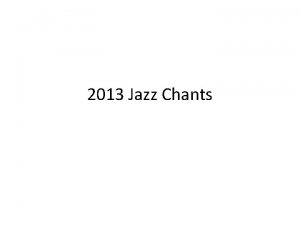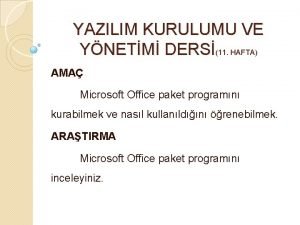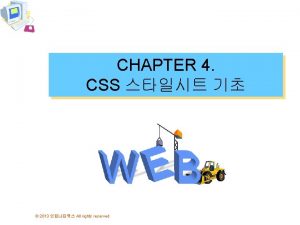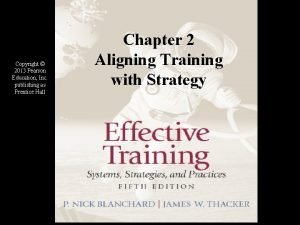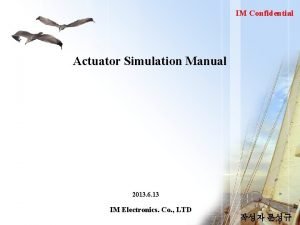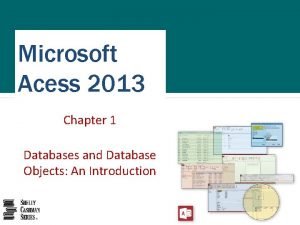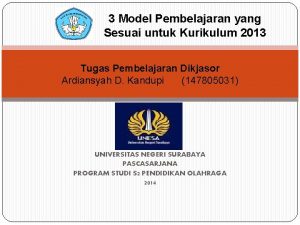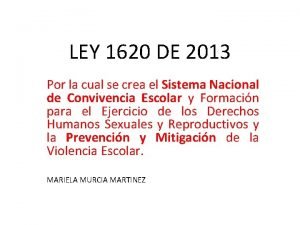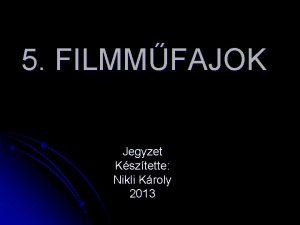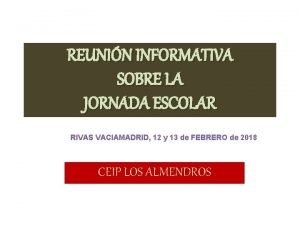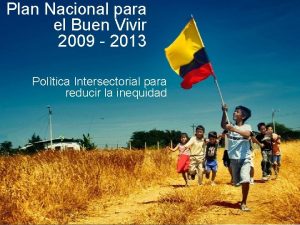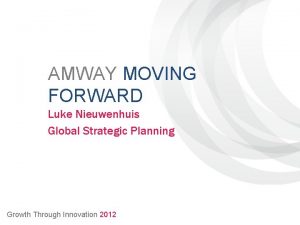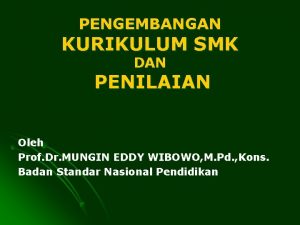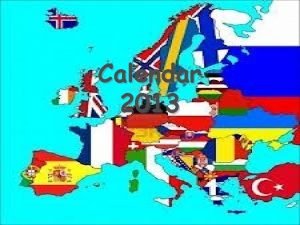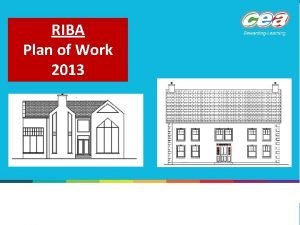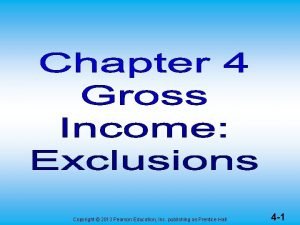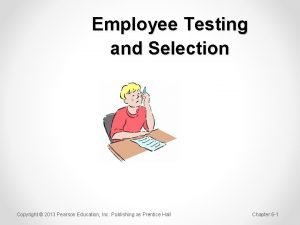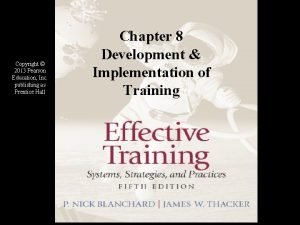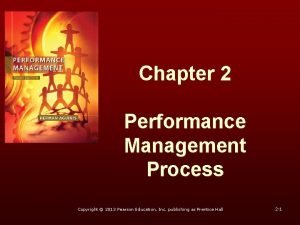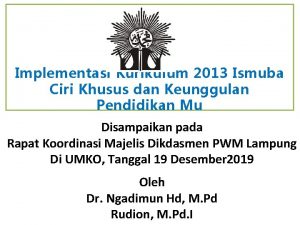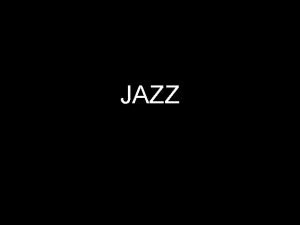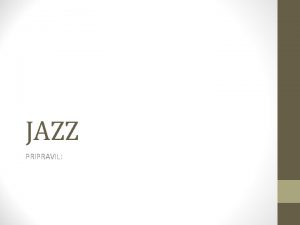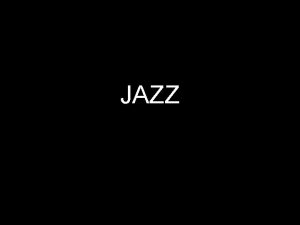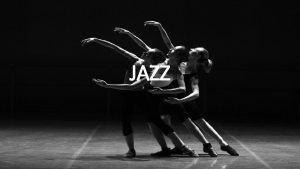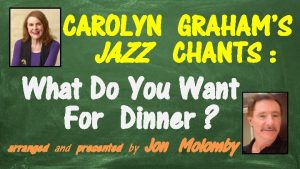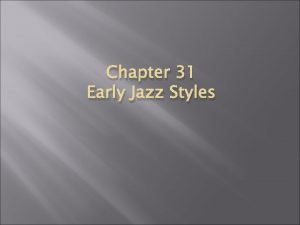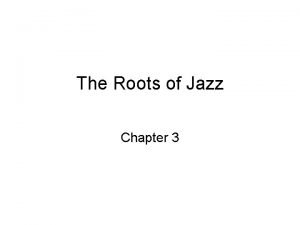2013 Jazz Chants Jazz Chants Jazz chants are















































- Slides: 47

2013 Jazz Chants

Jazz Chants • Jazz chants are based on a combination of repetition and learned response. Jazz chants set everyday situational English to strong rhythms that give the user practice with pronunciation, stress and the patterns of English. The rhythm is the glue that holds the chant together and you find that the language “sticks” in your head and so aids learning.

Jazz Chants • They are like Raps, poems or dialogues with a clear steady beat and rhythm and the Chinese teachers respond well to the chants as they are familiar with this method of choral chanting. • They are an effective and fun approach to language learning but they also provide a good way to model and then repeat.

Jazz Chants Method • The essential element in presenting a chant is to maintain a clear, steady beat and rhythm. • Review the chant-the cultural context, the situation. • Model the chant. Suggest that they tap out the rhythm with a pencil or tap the table with their fingers as they listen to the chant.

Jazz Chants • Choral chanting-take one line or section at a time depending on the ability of the class. Practice any parts, pronunciation that the students have difficulty with. • Group or individual chanting. Act out the chant if necessary or helpful. • Personalize the chants-substitute their own names, situations etc. • Exercises based on the chants.

1. Departure and return home Departure Have a wonderful trip! Don’t forget to call me when you get back. Have a wonderful trip! Don’t worry, I will. Don’t forget to call me. Don’t worry I won’t. Don’t forget to call me. Don’t worry, I won’t.

1. Departure and return home Return home Hi, it’s good to see you. You look wonderful. So do you. It’s been a long time. It certainly has. I missed you terribly. Me too. I’m so glad you’re back. So am I. Affirmative commands-use the answer “I will” negative command forms-use “I won’t” pronunciation-contractions-don’t, won’t, it’s, I’m. the final “t” sound in the past form-“missed”

2. Personal questions Where were you born? • I’d rather not say. Where are you from? • I’d rather not say. How tall are you? How old are you? How much do you weigh? • I’d rather not say. How much rent do you pay? • I’d rather not say. How much do you earn? • I’d rather not say.

2. Personal questions Why aren’t you married? • I’d rather not say. Why don’t you have children? • I’d rather not say. Where were you last night? Why weren’t you home? Did you stay out late? Did you come home alone? Did you have a good time? Did you see a good play? Did you go to a concert? I’d rather not say.

2. Personal questions • Practice with questions-where, how much, why? • Acceptable questions to ask-becoming increasingly more personal. • I’d rather not say is a polite way to avoid answering a question.

3. Taking credit Whose book is this? It’s mine! Are you sure it’s not his? No. no, it’s mine. Whose work is this? This beautiful work! It’s mine! Whose work is this? This awful work? It’s his! Are you sure it’s not yours? Of course it’s not mine! It’s certainly not mine! Not mine, not mine!

3. Taking credit Not yours? Not mine! Are you sure? I’m sure! It’s his? It’s his! Not yours? Not mine! Possessive pronouns-mine, his, yours. Pronunciation-final z sound in his, yours. Certainly, of course-for emphasis. Intonation patterns-rising yes/no question intonation/falling intonation of Wh- questions. Exclamation intonation-It’s his!

4. It’s got to be somewhere Where is it? I can’t find it. She can’t find it. It’s got to be here. It has to be here. It must be here. It’s gone! Take it easy! It has to be here. It must be here. It can’t be lost. It’s got to be here. Try to remember.

4. It’s got to be somewhere I can’t remember. Try to remember. I can’t remember. Think back. I can’t think. Where did you put it? I can’t remember. Oh! Here it is! Thank heavens! I found it. She found it. Here it is! Wow! Helpful suggestions. Modals-have got to, have to and must. It’s-It has and also It’s=It is

5. My PC Cursor, keyboard, monitor, mouse. There’s a personal computer In my house. Disc drive and discs. Where’s the CD? My personal computer is looking for me.

5. My PC Cursor, keyboard, monitor, mouse. I like that PC in my house. It’s user friendly, If you try. But don’t forget to switch on the power supply.

8. I can play basketball Yoga, yoga I can do yoga. Can you do yoga too? I can't do yoga but I can do karate. Can you do karate too? I can't do karate but I can play basketball. Can you play basketball too? I can't play basketball but I can ice skate. Can you ice skate too? I can't ice skate, but I can ski. Can you ski too? I can't ski but I can play volleyball. Can you play volleyball too?

9. Where can I buy a ticket? Excuse me, where's the coffee shop? Not here! It's behind the ticket office. Excuse me, where's the coffee shop? Not here! It's across from the exit. Excuse me, where's the coffee shop? Not here! It's between the phone booth and the luggage lockers. Excuse me, where's the coffee shop? Not here! It's in front of the restrooms. Excuse me, where's the coffee shop? It ‘s here. But sorry! It's closed!

10. I do karaoke on Wednesdays Mondays, Mondays. What do you do on Mondays? On Mondays I usually watch television. Tuesdays, Tuesdays. What do you do on Tuesdays? On Tuesdays I sometimes go for a walk. Wednesday, Wednesday. What do you do on Wednesdays? On Wednesdays I always go to the market.

10. I do karaoke on Wednesdays Thursday, Thursday. What do you do on Thursdays? On Thursdays I often go to a football game. Fridays, Fridays. What do you do on Fridays? On Fridays I always do karaoke. Weekends, Weekends. What do you do at the weekend? On weekends I usually stay in bed.

11. I have a headache Head, head, I have a headache. And my eyes hurt! Stomach, stomach, I have a stomach ache. And I have flu! Ear, ear, I have an earache And I have a fever! Tooth, tooth, I have a toothache And a sore throat!

11. I have a headache Back, back, I have a backache And my knee hurts! I have a headache, I have an ear ache. A toothache, a backache And a sore throat! My eyes hurt, my knee hurts, I have a stomach ache. I have a fever. And I have the flu!

12. I get up at seven thirty I get up at seven o' clock. Here's my day. This is what I do. I get up at seven o'clock. Seven o'clock? Seven o'clock. I take a shower at seven thirty. Seven thirty? Seven thirty. I have breakfast at seven forty-five? seven forty-five. I go to school at eight fifteen. Eight fifteen? Eight fifteen.

12. I get up at seven thirty I start classes at nine o'clock. Nine o'clock? Nine o'clock. I have lunch at one o'clock. One o'clock? One o'clock. I go home at five fifteen. Five fifteen? Five fifteen. I have dinner at seven thirty. Seven thirty? Seven thirty. I go to bed at ten forty- five. Ten forty-five? Ten forty-five. And then I start all over again. . .

13. I'm babysitting on Thursday Would you like to go out on Monday? No, sorry. I can't. Why not? I'm babysitting on Monday. Would you like to go out on Tuesday? No, sorry. I can't. Why not? I'm doing my laundry on Tuesday. Would you like to go out on Wednesday? No, sorry. I can't. Why not? I'm working overtime on Wednesday.

13. I'm babysitting on Thursday Would you like to go out on Thursday? No, sorry. I can't. Why not? I'm working out on Thursday. Would you like to go out on Friday? No, sorry. I can't. Why not? I'm visiting relatives on Friday. Would you like to go out at the weekend? Well. . Maybe!

14. He's passed his driving tes Upset, upset, I'm really upset. I've had an argument with my boyfriend. I'm really upset. Relieved, relieved. I'm really relieved. I've found my wallet. I'm really relieved.

14. He's passed his driving tes Disappointed, disappointed. I'm really disappointed. I've failed my driving test. I'm really disappointed. Thrilled, thrilled. I'm really thrilled. I've won the lottery. And now I'm rich!

15. Add some salt and pepper Wash, wash the lettuce. Slice, slice the cheese. Put some butter on the bread. Can I have my sandwich please? Fry, fry the tomatoes. Put them on the pizza base. Add some cheese and bake it slowly. Mmm! Can I have a taste?

16. I'll have soup please What would you like for your appetizer? I'll have soup. I'll have salad too. Two salads and one soup for table number two. What would you like for your main course? I'll have fish. I'll have beef. I'll have stir- fried pork. One fish, one beef, one stir-fried pork for table number four.

16. I'll have soup please What would you like for your dessert? I'll have ice-cream. I'll have fruit tart. Nothing, thanks, for me. One ice cream and one fruit tart for table number three.

Jazz Chants 17. I twisted my ankle Ow! What happened? I was lifting a heavy bag and i hurt my back! Ow! What happened? I was changing a light bulb and i got an electric shock! Ow! What happened? I was slicing an onion and I cut my finger! Ow! What happened? I was making some tea and i burned my hand! Ow! What happened? I was climbing up a ladder and i fell off and broke my leg!

Jazz Chants 18. My computer's crashed Computer, computer. I love my computer. My printer, my keyboard, my mouse. I never have problems, I use it all day. I never go out of the house! Computer, computer. I hate my computer. My modem, my disc drive, my screen. I always have problems, It 's driving me crazy. Computers make me want to scream!

Jazz Chants 19. I got engaged in January A. Did you hear the gossip? Did you hear the news? B. No, I didn't. What's the story? Tell me all the C. No, I didn't, what's the story? Tell me all the news! B. Well Mr. Smith retired last month. A. Well, Mr. Smith retired last month. C. Mr. Smith retired? B. And Mrs. Jones moved last week. A. And Mrs. Jones moved last week. C. Mrs. Jones moved? B. Mr. Green got married in June. A. Mr. Green got married in June. C. Mr. Green got married? B. And a week ago Dick Harper died. A. And a week ago, Dick Harper died. C. Dick Harper died? B. Dick Harper died? A. I think that's it. I'd better go! I have a lot to do. B. Well, thanks a lot. It was really good to talk to C. Well, thanks a lot. It was really good to talk to you.

Jazz Chants 20. These are my blue jeans That's my shirt. This red shirt? No, that brown shirt. Those are my shoes. These brown shoes? No, those black shoes. This is my jacket. That green jacket? No, this blue jacket. That's my T-shirt. This white T-shirt? No, that red T-shirt. These are my jeans. Those black jeans? No, these blue jeans. Those are my shorts. These green shorts? No, those white shorts.

Jazz Chants 21. I’m always right I’m right. Clap, clap I’m always right. You’re wrong, Clap, clap You’re always wrong. Sometimes I’m wrong. That’s right. Clap, clap. You’re always wrong. I’m right. Clap, clap.

A circle/clapping game to introduce names . 7 Who stole the cookie from the cookie jar? (You must keep the clapping rhythm going!) • • • • • Who stole the cookie from the cookie jar? Lynn stole the cookie from the cookie jar. (Lynn) Who me? Yes you! (Lynn) Couldn't be! Then who? (Lynn) Wendy stole the cookie from the cookie jar. (Wendy))Who me? (Lynn) Yes you! (Wendy) Couldn't be! (Lynn )Then who? Ruhong stole the cookie from the cookie jar (Ruhong) Who me? Yes you! Couldn't be! Then who? Name. . .

6. Stamp, slap, click Stand up for this-and get faster and faster each time! Helps to wake up the class! • Stamp, stamp, stamp. 4 X • Slap, slap, slap. 4 X • Clap, clap, clap. 4 X • Click, click, click. 4 X • Stamp, stamp 3 X • Stamp, stamp 2 X • Stamp, Slap, Click 1 X

SONG Head and shoulders knees and toes • • • 1. Head and shoulders knees and toes, knees and toes. And eyes and ears and mouth and nose Head and shoulders knees and toes, knees and toes. 2. Forehead, chest and hips and feet, hips and feet. And neck and back and ankles too Forehead, chest and hips and feet, hips and feet.

SONG Head and shoulders knees and toes • • • 3. Cheeks and arms and thighs and calves, thighs and calves. And elbows , stomach, soles of feet Cheeks and arms and thighs and calves, thighs and calves. 4. Face and fingers, wrists and hands, wrists and hands And thumbs and chin and legs and all Face and fingers, wrists and hands

Activities that promote language learning • Circle activities Sentence Stems: I like … because My favourite. . . is. . . . The last time I. . . . . I want to. . .

Cross the circle

Lining up Line up in order • The number of years that you have been teaching • Alphabetical order of your English name • The tallest to the smallest person in the group.

Activities that promote language learning Talking Partners Tell your partner Co-operative pair/group work Teach students how to work in groups – model the process and language for them These can be groups to plan projects – drama activities- discussion groups-cooking- model making-making games.

Activities that promote language learning Talking Partners Tell your partner Co-operative pair/group work Teach children how to work in groups – model the process and language for them These can be groups to plan projects – drama activities- discussion groups-cooking- model making-making games.


 Antigentest åre
Antigentest åre Carolyn graham jazz chants
Carolyn graham jazz chants Chants à marie
Chants à marie Ice cream jump rope song
Ice cream jump rope song Origin of jazz chant
Origin of jazz chant Hudhud chants of the ifugao threats
Hudhud chants of the ifugao threats Language
Language Office 2013 sistem gereksinimleri
Office 2013 sistem gereksinimleri Css 2013
Css 2013 2013 pearson education inc
2013 pearson education inc 2013 hospital national patient safety goals
2013 hospital national patient safety goals Boulder 2013 flood map
Boulder 2013 flood map 2013 pearson education inc
2013 pearson education inc What is ghag
What is ghag 2013/6/13
2013/6/13 2013 pearson education inc
2013 pearson education inc Acess 2013
Acess 2013 Iso 690 2013
Iso 690 2013 Landasan hukum kurikulum 2013
Landasan hukum kurikulum 2013 Mendeley literaturverzeichnis erstellen
Mendeley literaturverzeichnis erstellen Model model pembelajaran kurikulum 2013
Model model pembelajaran kurikulum 2013 Silabus dan rpp sekolah inklusi
Silabus dan rpp sekolah inklusi Rumus menentukan sampel
Rumus menentukan sampel Exchange 2013 architecture
Exchange 2013 architecture Ley 1620 de 2013 situaciones tipo 1 2 y 3
Ley 1620 de 2013 situaciones tipo 1 2 y 3 Strategi penilaian
Strategi penilaian Journal citation reports 2013
Journal citation reports 2013 Fall 2013
Fall 2013 Filmfajták
Filmfajták Ceip los almendros rivas
Ceip los almendros rivas Uraikan tentang efektivitas rumus pada microsoft excel 2013
Uraikan tentang efektivitas rumus pada microsoft excel 2013 Plan nacional del buen vivir 2009 al 2013
Plan nacional del buen vivir 2009 al 2013 Amway plan 2016
Amway plan 2016 Contoh instrumen inventori
Contoh instrumen inventori Inpc 2013
Inpc 2013 Struktur kurikulum 2013 smk
Struktur kurikulum 2013 smk Banöverbyggnad
Banöverbyggnad Calendar 2013 ianuarie
Calendar 2013 ianuarie Riba pow
Riba pow What is ngo
What is ngo Quran in word 2013
Quran in word 2013 Best law firm websites 2013
Best law firm websites 2013 2013 pearson education inc
2013 pearson education inc Change the smartart colors to gradient loop accent 2
Change the smartart colors to gradient loop accent 2 2013 pearson education inc. answers
2013 pearson education inc. answers 2013 pearson education inc
2013 pearson education inc 2013 pearson education inc
2013 pearson education inc Ismuba kurikulum 2013
Ismuba kurikulum 2013

